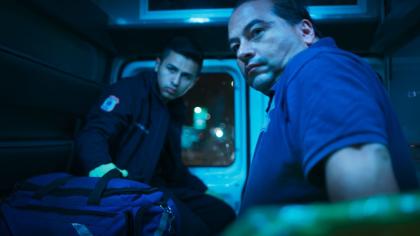Shortlisted Emergency Healthcare Doc ‘Midnight Family’ Raises “Big Ethical Questions”

Click here to read the full article.
Filmmaker Luke Lorentzen is only a few years out of college, but his first major feature—the viscerally exciting Midnight Family—has made the Oscar documentary shortlist. It’s the story of the Ochoas—father Fer and sons Juan and Josué and their associate Manuel Hernández, who operate a run-and-gun private ambulance service in Mexico City.
Lorentzen moved to the Mexican capital in 2013 after graduating from Stanford University, relocating there on something of a whim.
More from Deadline
“[It was] a little bit of a spontaneous decision. I was 23 years old and didn’t have a job. And I had a few ideas of films that I wanted to try and make,” Lorentzen recalls. “The ideas I was trying to pull off just weren’t really working out. But one morning I woke up and, parked right in front of a house that I was living in, was the Ochoa family and their private ambulance. I guess I was curious enough to ask them if I could ride along for a night.”

That chance encounter introduced Lorentzen to the Wild West of emergency medical treatment in Mexico City, a metropolis of 9 million that, the film notes, is serviced by fewer than 45 public ambulances.
“There would be weeks at a time where I wouldn’t see a single government ambulance showing up to accidents,” the director says. “You have families like the Ochoas that see a need for more ambulances and take it into their own hands to start these for-profit ambulance companies that chase each other to accidents and compete for patients.”
There are extraordinary scenes in Midnight Family where the Ochoas, monitoring police scanners, hear of injured parties somewhere in the city and spring into action, racing other ambulances to get there first. Imagine Bullitt, but with emergency vehicles careening around the streets. Many of these medi-wagons are not exactly state of the art.
“The Ochoas were able to get their hands on this ambulance that actually came from Oklahoma,” Lorentzen comments. “It’s a retired U.S. ambulance that was no longer up to code here in the U.S. and it got sent down to Mexico for people like them.”
The medical training for many of these ad-hoc first responders appears sketchy. The Ochoas prove eager to provide top-level care, but the system invites corner-cutting. For instance, there is a constant temptation to divert patients to private hospitals which are more likely to pay for ambulance services, instead of public hospitals that may be closer to the scene of an accident.
“[I] saw this whole underworld of for-profit health care that was raising really big ethical questions, but also keeping a city from falling apart,” Lorentzen observes. “The film is so much about these ambiguous ethical moments. And some [viewers] really want answers and find that to be sometimes unfulfilling. So it’s a balance of giving people enough to chew on and enough to really process what’s going on without giving you the answer to things that truly don’t have good answers.”

Midnight Family is now playing in theaters around the country. Lorentzen shot the film, wrote, edited and produced it (along with fellow producer Kellen Quinn) and recently won the Best Editing Prize at the IDA Documentary Awards in Los Angeles. Midnight Family also claimed the Grand Jury Prize at the prestigious Sheffield International Documentary Festival in England. Not bad for a 26-year-old filmmaker.
“We premiered at Sundance in January and I have been essentially on the road for the entire year traveling to festivals all over the world. We’ve played maybe 140 film festivals,” Lorentzen notes. “There’s something so magical about taking this story that originated in Mexico to Denmark or Hong Kong or St. Petersburg and having people really respond to it and be able to connect with these people and this story.”
Midnight Family features the cinematic look and punch of a Hollywood action film, complete with handsome leading man—17-year-old Juan Ochoa, who navigates the ambulance from behind the wheel, and also serves as a moral compass.
“Juan is really somebody that sticks out and has a charisma to him that audiences relate to,” Lorentzen affirms. “I think there’s something about his teenage energy that people get excited about. And so every time there was something about the work that started to feel a little ethically tough, I wanted it to be with Juan at the center. Because he was truly trying to do his best, that I knew that people would see that.”
Providing comic relief is Juan’s much younger brother Josué, a chubby kid with a saltiness of speech beyond his years.
“Josué, the little boy, some of the things he says, you’d expect to come from a 45-year-old man,” Lorentzen laughs. “It’s really vulgar coming from a nine-year-old boy. He’s really comedic.”
The director even thought at one point of building the film around Josué. He also did a cut where the father, Fer (short for Fernando), took center stage. The final structure clearly worked, resonating with audiences and now with Oscar voters. Lorentzen says he’s thrilled about making the feature documentary shortlist.
“It’s incredible and far beyond my wildest dreams for this project,” he tells Deadline. “Word of mouth and love for the film is carrying it along in a way that’s been so special this whole year. So gratefulness, surprise, excitement, slight overwhelming.”
Best of Deadline
Stan Lee's Legacy: Ranking The Hollywood Heroes Co-Created By The Marvel Comics Icon
Disney-Fox Deal: How It Ranks Among Biggest All-Time Media Mergers
Sign up for Deadline's Newsletter. For the latest news, follow us on Facebook, Twitter, and Instagram.
